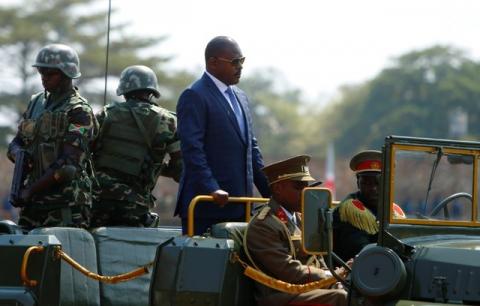Advertisement
Burundi takes steps to extend president's rule as crisis deepens
NAIROBI (Reuters) - Burundi's cabinet backed a constitutional change that would allow its president to stay in office until 2034, widening a political rift that has driven the country progressively deeper into crisis.
Under existing laws, Burundian presidents are limited to two five-year terms.
Unrest that has gripped Burundi since April 2015, when Pierre Nkurunziza announced he would stand for a third, has killed hundreds, left the economy moribund and forced about 400,000 people to seek safety in neighboring countries.
UN rights investigators and independent activists have accused government forces of widespread violations including forced disappearances, and of orchestrating a campaign of terror.
A senior government official told Reuters on Friday that the cabinet adopted the draft legislation seeking to amend the constitution on Tuesday.
Nkurunziza, who has been in office since 2005, won re-election in July 2015 in a ballot that critics said violated the constitution and the terms of an agreement that ended a previous rebellion.
Nkurunziza's backers said the country's constitutional court had cleared him to run again, but some opponents took up arms against his rule and insecurity has plagued the country since.
Other African leaders have in the recent past also tinkered with or defied their constitutions to extend their rule, including Uganda's President Yoweri Museveni, Rwanda's Paul Kagame and Democratic Republic of Congo's Joseph Kabila.
Proposed amendments under the Burundian bill seek to abolish the two-term limit and lengthen presidential terms to seven years. Incumbents would be able to serve two consecutive terms of seven years each and also be eligible to seek re-election after an interregnum.
If the amendment was passed by parliament, "the current head of state can rule until 2034," the source said.
A second official told Reuters the government would hold a referendum on the draft legislation next year, but did not say which month.
Opposition officials have criticized the legislation which they say was initiated in secrecy and designed to entrench Nkurunziza in power.
"No one knew what was being done. It was done in total secrecy...we will always oppose it," deputy president of the opposition FRODEBU party, Leonce Ngendakumana, told Reuters.
"The constitution should not be revised in a tense social climate."
(Writing by Elias Biryabarema; editing by John Stonestreet)



















Add new comment